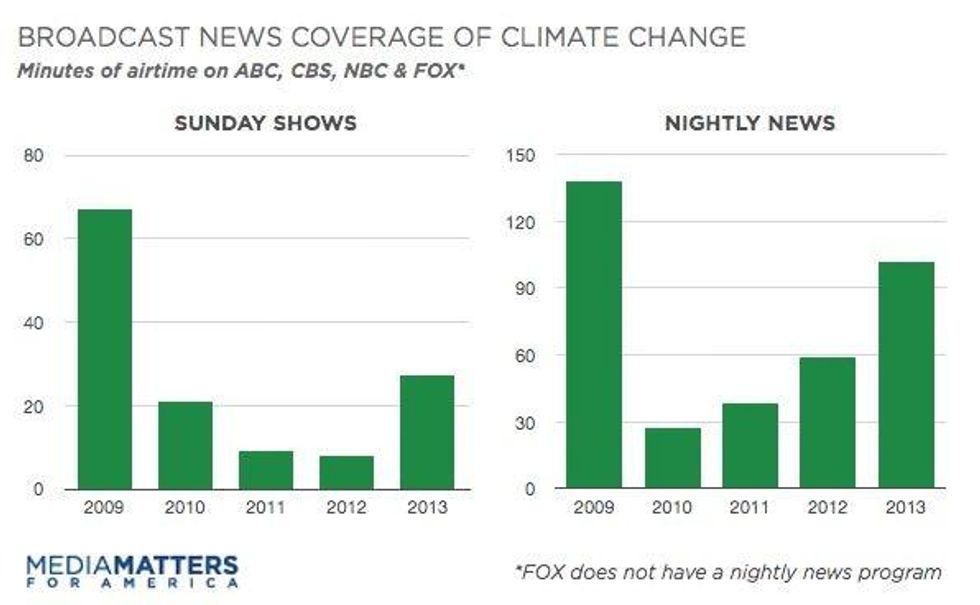

SUBSCRIBE TO OUR FREE NEWSLETTER
Daily news & progressive opinion—funded by the people, not the corporations—delivered straight to your inbox.
5
#000000
#FFFFFF
To donate by check, phone, or other method, see our More Ways to Give page.


Daily news & progressive opinion—funded by the people, not the corporations—delivered straight to your inbox.

"We are more than aware that major fossil fuel companies spend significant amounts of money advertising on your networks. We hope that this is not influencing your decision about the subjects discussed or the guests who appear on your network programming."
That's according to a new analysis by news watchdog Media Matters, released Thursday, which shows that news coverage by ABC, CBS, NBC and FOX peaked in 2009 but has flat-lined since even as the scientific case and evidence of global warming has significantly raised the threat level of the problem over the last five years.
As the group states in their report, though they did better in 2013 than in 2012, the largest corporate media news channels "offered tepid coverage" of climate change despite a major report by the IPCC, a presidential speech by Obama focused on the issue, and a serious scientific milestone on global warming as the carbon concentration of the atmosphere hit 400 parts per million for the first time in human history.
Despite all that, "broadcast news' climate coverage remained relatively low" compared to other years.
According to the study: "Altogether, ABC, CBS and NBC reported on global warming for nearly an hour and 42 minutes during their nightly newscasts in 2013, compared to a combined total of less than an hour in all of 2012. The majority of this coverage -- 58 percent -- was driven by stories on climate change's relation to extreme weather or impacts on wildlife, while 19 percent was driven by scientific findings, another 19 percent by political stories related to climate change, and 4 percent by other stories."
And on the networks' political weekend shows? "Out of a year's worth of coverage, the Sunday shows focused on climate change for 27 minutes, the most aired since 2009."
By the numbers:

And citing Media Matter's study, a group of U.S. senators, led by Vermont's Sen. Bernie Sanders, sent a letter (pdf) to executives from these news outlets asking why there has been "shockingly little discussion" about global warming on their Sunday morning shows and other highly-watched programs.
"Given the widely recognized challenge that climate change poses to the nation and the world, this is an absurdly short amount of time for a subject of such importance," the senators said in the letter.
And not avoiding the gorilla in the room when it terms of the chief possible reason for the poor coverage, the senators continued:
We are more than aware that major fossil fuel companies spend significant amounts of money advertising on your networks. We hope that this is not influencing your decision about the subjects discussed or the guests who appear on your network programming.
___________________________________________________
Dear Common Dreams reader, The U.S. is on a fast track to authoritarianism like nothing I've ever seen. Meanwhile, corporate news outlets are utterly capitulating to Trump, twisting their coverage to avoid drawing his ire while lining up to stuff cash in his pockets. That's why I believe that Common Dreams is doing the best and most consequential reporting that we've ever done. Our small but mighty team is a progressive reporting powerhouse, covering the news every day that the corporate media never will. Our mission has always been simple: To inform. To inspire. And to ignite change for the common good. Now here's the key piece that I want all our readers to understand: None of this would be possible without your financial support. That's not just some fundraising cliche. It's the absolute and literal truth. We don't accept corporate advertising and never will. We don't have a paywall because we don't think people should be blocked from critical news based on their ability to pay. Everything we do is funded by the donations of readers like you. Will you donate now to help power the nonprofit, independent reporting of Common Dreams? Thank you for being a vital member of our community. Together, we can keep independent journalism alive when it’s needed most. - Craig Brown, Co-founder |

"We are more than aware that major fossil fuel companies spend significant amounts of money advertising on your networks. We hope that this is not influencing your decision about the subjects discussed or the guests who appear on your network programming."
That's according to a new analysis by news watchdog Media Matters, released Thursday, which shows that news coverage by ABC, CBS, NBC and FOX peaked in 2009 but has flat-lined since even as the scientific case and evidence of global warming has significantly raised the threat level of the problem over the last five years.
As the group states in their report, though they did better in 2013 than in 2012, the largest corporate media news channels "offered tepid coverage" of climate change despite a major report by the IPCC, a presidential speech by Obama focused on the issue, and a serious scientific milestone on global warming as the carbon concentration of the atmosphere hit 400 parts per million for the first time in human history.
Despite all that, "broadcast news' climate coverage remained relatively low" compared to other years.
According to the study: "Altogether, ABC, CBS and NBC reported on global warming for nearly an hour and 42 minutes during their nightly newscasts in 2013, compared to a combined total of less than an hour in all of 2012. The majority of this coverage -- 58 percent -- was driven by stories on climate change's relation to extreme weather or impacts on wildlife, while 19 percent was driven by scientific findings, another 19 percent by political stories related to climate change, and 4 percent by other stories."
And on the networks' political weekend shows? "Out of a year's worth of coverage, the Sunday shows focused on climate change for 27 minutes, the most aired since 2009."
By the numbers:

And citing Media Matter's study, a group of U.S. senators, led by Vermont's Sen. Bernie Sanders, sent a letter (pdf) to executives from these news outlets asking why there has been "shockingly little discussion" about global warming on their Sunday morning shows and other highly-watched programs.
"Given the widely recognized challenge that climate change poses to the nation and the world, this is an absurdly short amount of time for a subject of such importance," the senators said in the letter.
And not avoiding the gorilla in the room when it terms of the chief possible reason for the poor coverage, the senators continued:
We are more than aware that major fossil fuel companies spend significant amounts of money advertising on your networks. We hope that this is not influencing your decision about the subjects discussed or the guests who appear on your network programming.
___________________________________________________

"We are more than aware that major fossil fuel companies spend significant amounts of money advertising on your networks. We hope that this is not influencing your decision about the subjects discussed or the guests who appear on your network programming."
That's according to a new analysis by news watchdog Media Matters, released Thursday, which shows that news coverage by ABC, CBS, NBC and FOX peaked in 2009 but has flat-lined since even as the scientific case and evidence of global warming has significantly raised the threat level of the problem over the last five years.
As the group states in their report, though they did better in 2013 than in 2012, the largest corporate media news channels "offered tepid coverage" of climate change despite a major report by the IPCC, a presidential speech by Obama focused on the issue, and a serious scientific milestone on global warming as the carbon concentration of the atmosphere hit 400 parts per million for the first time in human history.
Despite all that, "broadcast news' climate coverage remained relatively low" compared to other years.
According to the study: "Altogether, ABC, CBS and NBC reported on global warming for nearly an hour and 42 minutes during their nightly newscasts in 2013, compared to a combined total of less than an hour in all of 2012. The majority of this coverage -- 58 percent -- was driven by stories on climate change's relation to extreme weather or impacts on wildlife, while 19 percent was driven by scientific findings, another 19 percent by political stories related to climate change, and 4 percent by other stories."
And on the networks' political weekend shows? "Out of a year's worth of coverage, the Sunday shows focused on climate change for 27 minutes, the most aired since 2009."
By the numbers:

And citing Media Matter's study, a group of U.S. senators, led by Vermont's Sen. Bernie Sanders, sent a letter (pdf) to executives from these news outlets asking why there has been "shockingly little discussion" about global warming on their Sunday morning shows and other highly-watched programs.
"Given the widely recognized challenge that climate change poses to the nation and the world, this is an absurdly short amount of time for a subject of such importance," the senators said in the letter.
And not avoiding the gorilla in the room when it terms of the chief possible reason for the poor coverage, the senators continued:
We are more than aware that major fossil fuel companies spend significant amounts of money advertising on your networks. We hope that this is not influencing your decision about the subjects discussed or the guests who appear on your network programming.
___________________________________________________